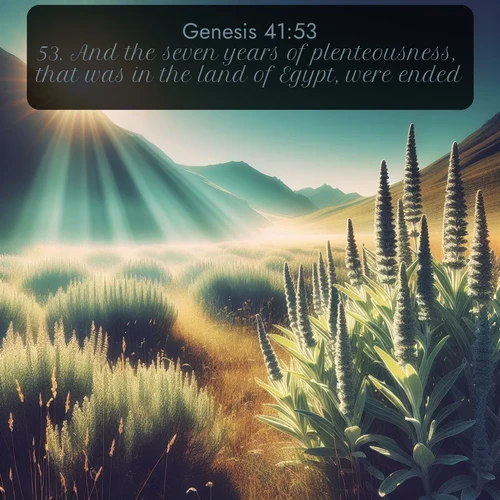Genesis 41:53 plusieurs versions / traductions
English Bible Translations
53. And the seven years of plenteousness, that was in the land of Egypt, were ended.
53. And the seven years of plenty, that was in the land of Egypt, came to an end.
53. And the seven years of plenteousness that was in the land of Egypt, were ended.
53. And the seven years of plenty are completed which have been in the land of Egypt,
German Bible Translations
53. Als nun die sieben Jahre des Überflusses im Lande Ägypten verflossen waren,
French Bible Translations
53. Et les sept années de l'abondance qui avait été dans le pays d'Égypte finirent;
53. Alors finirent les sept années de l'abondance qui avait été au pays d'Egypte.
53. Alors finirent les sept années de l'abondance qu'il y eut au pays d'Égypte.
Versions with Strong Codes
Genesis 41 / KJV_Strong53. And the seven[H7651] years[H8141] of plenteousness,[H7647] that[H834] was[H1961] in the land[H776] of Egypt,[H4714] were ended.[H3615]
Strong Code definitions
H7651 sheba` sheh'-bah or (masculine) shibrah {shib-aw'}; from H7650; a primitive cardinal number; seven (as the sacred full one); also (adverbially) seven times; by implication, a week; by extension, an indefinite number:--(+ by) seven(-fold),-s,(-teen, -teenth), -th, times). Compare 7658. see H7650see H7658
H8141 shaneh shaw-neh' (in plura or (feminine) shanah {shaw-naw'}; from H8138; a year (as a revolution of time):--+ whole age, X long, + old,year(X -ly). see H8138
H7647 saba` saw-baw' from H7646; copiousness:--abundance, plenteous(- ness, -ly).
H834 'aher ash-er' a primitive relative pronoun (of every gender and number); who, which, what, that; also (as an adverb and a conjunction) when, where, how, because, in order that, etc.:--X after, X alike, as (soon as), because, X every, for, + forasmuch, + from whence, + how(-soever), X if, (so) that ((thing) which, wherein), X though, + until, + whatsoever, when, where(+ -as, -in, -of, -on, -soever, -with), which, whilst, + whither(- soever), who(-m, -soever, -se). As it isindeclinable, it is often accompanied by the personal pronoun expletively, used to show the connection.
H1961 hayah haw-yaw a primitive root (compare 1933); to exist, i.e. be or become, come to pass (always emphatic, and not a mere copula or auxiliary):--beacon, X altogether, be(-come), accomplished, committed, like), break, cause, come (to pass), do, faint, fall, + follow, happen, X have, last, pertain, quit(one-)self, require, X use. see H1933
H776 'erets eh'-rets from an unused root probably meaning to be firm; the earth (at large, or partitively a land):--X common, country, earth, field, ground, land, X natins, way, + wilderness, world.
H4714 Mitsrayim mits-rah'-yim dual of H4693; Mitsrajim, i.e. Upper and Lower Egypt:--Egypt, Egyptians, Mizraim.see H4693
H3615 kalah kaw-law' a primitive root; to end, whether intransitive (to cease, be finished, perish) or transitived (to complete, prepare, consume):--accomplish, cease, consume (away), determine, destroy (utterly), be (when ... were) done, (be an) end (of), expire, (cause to) fail, faint, finish, fulfil, X fully, Xhave, leave (off), long, bring to pass, wholly reap, make clean riddance, spend, quite take away, waste.
Prédications qui analysent les thèmes Genèse 41
Thèmes : Joseph au service de Pharaon; Interprétation des rêvesDieu agit-Il plus dans la difficulté ou dans la réussite ? Genèse 41
Related Sermons discussing Genesis 41
Themes : Joseph au service de Pharaon; Interprétation des rêvesDoes God act more in difficulty or in success? Genesis 41
see also: Bible Key Verses ; KJV Bible Images, BBE Bible images

